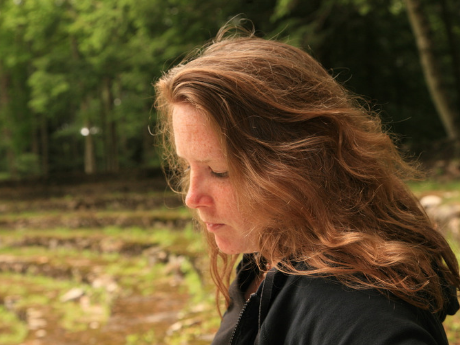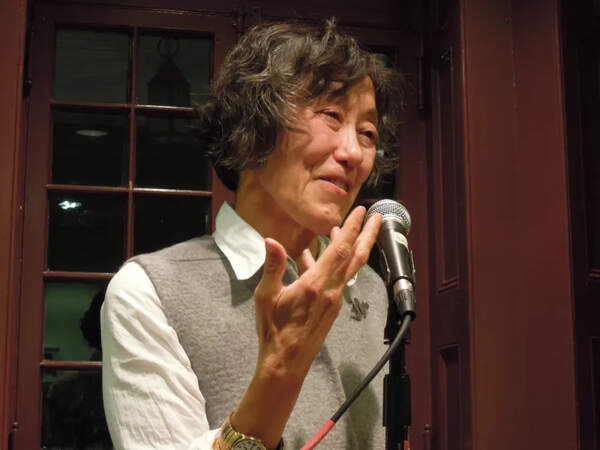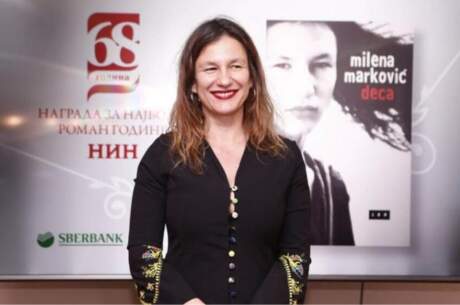Interviews
The Song Is Always There: Maureen N. McLane

Based in New York, American poet and professor Maureen N. McLane has recently released a new book of poems, Some Say (Farrar, Straus & Giroux, 2017), just a year after the publication of what could be read as a "novel-in-verse"—a "poem-in-episodes," Mz N: the serial (Farrar, Straus & Giroux, 2016). In this interview conducted in December 2017 and January 2018, McLane discusses about her idea(s) of a lyrical self, music in poetry and musical influences, as well as the various ways in which she hopes to honor "both mystery and clarity" in her work.
**
Sze-Lorrain: Were you interested in exploring self-mythology when you were piecing together MzN: the serial?
McLane: The whole question of what constitutes "a self," and a proper name, has long preoccupied me. I don't know about my relation to "self-mythology"—I worry that such a project might seem grand bordering on grandiose. (This may reflect my sensitivity to the excessive "self-mythologizing" of Americans...I suppose Whitman is our greatest poet of self-mythology/ democratic mythology.) I am certainly interested in the long history of persona poems, in the supposed relation of lyric to "self"hood, and in the figure of autobiography channeled or constituted through a character. It was great fun and also an ongoing challenge and spur to write with and through a character, Mz N, while also allowing myself an "I": to pivot throughout the book between third and first person, between dramatic/narrative scene-making and meditative/lyric modes and stances. I was definitely interested in exploring theories and philosophies of the self—psychoanalytic, lyric, philosophical, spiritual, ideological. One of my epigraphs comes from the philosopher Galen Strawson, who writes "against narrativity," and who distinguishes between "narrative/diachronic" and "episodic" selves: he believes that many poets are the latter. I definitely feel myself to align with his account of the "episodic" self (one who experiences being as intermittence, not as narrative continuity): narrative is not my native or main route to self-experience or self-understanding. So Mz N is a kind of paradoxing book, both narrative-ish and episodic, taking up some standard lyric topoi of self but activating an arc of development we might associate more with Bildung—though a very fractured Bildung!
Sze-Lorrain: Your next collection Some Say seems to take on the project of the unsayable/sayable [and all the grayness in-between]. In its opening poem, you say "If I say abstract // I don't mean ideal / I mean real." And in the following "Ok Let's Go," you indicate that "how to know // and unknow is everything." What about things that can't or shouldn't be known? Poetry, for instance—the mystery and its mysteries?
McLane: I think the poems in Some Say, and in some of my previous books, are invested in both mystery and clarity. I aspire to honor both—to maintain a kind of tact, the space of unknowing, what Keats called "negative capability." A lot of my poems carry a spirit of inquiry but also suspend themselves in a kind of agnosticism, acknowledging, as one poem has it, that before there was our scientized sky, beyond which lies an interstellar space we have extensively mapped and imaged, there was (and maybe still is) a sky "they once thought / was the dome of the world." Your question recalls to me the amazing ending of Elizabeth Bishop's poem, "At the Fishhouses":
It is like what we imagine knowledge to be:
dark, salt, clear, moving, utterly free,
drawn from the cold hard mouth
of the world, derived from the rocky breasts
forever, flowing and drawn, and since
our knowledge is historical, flowing, and flown.
"Knowledge" itself has to be imagined, mediated. It is always already figural.
The terms of your question also call to mind poets who matter a lot to me, great honorers of mystery and of The Mystery: H.D. and Robert Duncan. "Often I Am Permitted to Return to a Meadow." Duncan on Pindar, and H.D. H. D.'s "Trilogy," her interest in the Eleusinian Mysteries. James Merrill's Ouija board.
Sze-Lorrain: I like the tongue-twisting "I say / what they say / is sometimes what I say" in your title poem and "There you go / making images / because you don't know the names" from "Forest." Might you be suggesting that to some degree the [post-]modern intellect and the ear accepts better whatever that can be—and/or has been—named?
McLane: Yes! And the poems resist that. Or rather, some of the poems likely register how the ear is often more attentive than the brain. And the flow of substance exceeds the boundaries of the name. As Wordsworth wrote, "we murder to dissect," to taxonomize. I am both attracted and repelled by the Adamic impulse to name and thus claim. But there is another way to think of naming, as a zone of secret or cosmogonic utterance, through which being bodies forth. We might be dwelling in a world of present yet unknown or unspoken names. The poet Susan Howe has a wonderful proposition, that things might be signs of words, not words the signs of things.
Sze-Lorrain: What are some of your personal favorite poems from Some Say? How are the poems sequenced—that's, are they time- or narrative- or movement-specific?
McLane: Well, I am especially fond of the title poem, which takes wing from a fragment of Sappho, and of the ghazal "For You," and of the "Dawn School" poems and the "notational" sequences ("notational" a term I adopt from Barthes, in his musings on haiku). And "Mesh" distills a lot, especially in terms of ecological consciousness, as does "Against the Promise of a View."
The poems of Some Say are sequenced intuitively, musically, with some sensitivity too to seasonality. I wanted the first section to establish concerns and sounds and motifs; later sections would re-sound them in different keys, and move into elegiac and erotic modes, then historical and philosophical terrain, and back out into the environmental-elemental. This sounds more willed than it was—I always order things after I have written a lot, and I didn't begin sequencing the book until I had written all of the poems now within it. I found that many poems fell into more or less natural, resonant groups: no surprise, as they were often composed in bursts, in certain seasons of my life. In each section there is a sequence called "Notationals/Songs of a Season," short poems linked together: the title itself nods to sequences in my previous books also called "songs of a season." I like this idea of this book as part of an unfolding. So there is a kind of weave of motifs, with a lot of recurrence and variation—and, I hope, development! If anything, my ideas of sequencing are more musical than not. Sounding a note, transposing it, varying a motif, coming to a cadence.
Sze-Lorrain: In the poem "Enough," you write:
We told ourselves
we would read
nothing for six weeks.
The world was full
as it always was
of wings of meaning & nothing.
I must confess I chuckled when reading these ending stanzas, more so when they are coming from you an erudit, they feel "incorrigibly" ironic and funnier. Do you think poetry in our times is, too, this: "of wings of meaning & nothing"?
McLane: I am so glad you were amused! I will tell you something—that line about reading nothing for six weeks is adapted from...Wallace Stevens! As for poetry in our times: well, in the US at least, the emphasis now seems to be on meaning, communication, registering the extremity of our moment, not on channeling the nothing that might pulse below or within all. It seems to me that "meaning" and "nothing" might specify poles of an oscillation, in my work but perhaps in anyone's.
Sze-Lorrain: "I'm canceling all the noise / my earthened ears bring me," you utter in the piece "Headphones." How do you write silence?
McLane:
a) in stanza breaks
b) through white space
c) sonic negations, reduplications, cancellings out
d) by intent listening: silence is audible even within sound
Sze-Lorrain: Poems in your Some Say are all, in my opinion, sing-able—or shall I say, "sayable"?—and to paraphrase the title of the "Notational" series: songs of a season. Were you thinking of your poems as songs—literally—when working on this collection, in that they were and are intended to be heard [be they set to music] as much as read? What "season" do they speak for and about? Speaking of music, do you play any instrument? What music do you like or often listen to?
McLane: Thank you for these questions—which are especially rich coming from such a gifted musician and performer. A friend of mine said he thought this book could have been titled Song Book. And some poems I did think of as songs—little songs, para-madrigals or motets. But they weren't composed to tunes, as it were, or directly modelled on song form. I play the piano, organ, and guitar, not well but with a residual muscle memory and hope, and I was trained as a singer and sang extensively in choruses and in early music groups in years past. All this informs my writing, subliminally if not always overtly. "On Not Being Elizabethan" was inspired by hearing Ian Bostridge sing Dowland's songs. "Lyric" as itself a notional union of melody and language is something close to my heart—as in my interest in Sappho. One poem, "For You," was in fact set to music by the wonderful composer Judah Adashi: he had it performed at his wedding by the amazing Caroline Shaw (the composer and singer). But I didn't write these poems to be set; they have their own musics. I'm delighted if a musician wishes to set something, but I will confess that, despite my affinity for lieder cycles, I don't always love the more recent history of the art song, when 20th- or 21st-century composers set brilliant poems to music. There's a reason Schubert, Schumann, etc. often set mediocre poetry. While I love Ned Rorem, I don't love his settings of, say, Elizabeth Bishop, or Samuel Barber's of Joyce, or Persichetti's of Whitman—for me they interfere with my experience of the musics and rhythms already embodied in and by the poem. I should say that Judah's piece gives the lie to all this (and he's doing something quite different from the art song tradition).
In recent months I've been trying explicitly to write some song lyrics for a friend who commissioned them. That excites me. It's interesting to see how a poet like Paul Muldoon moves between writing song lyrics and his own vertiginous poetry. I think I would like to work as a librettist.
Music I like: it shifts! but some constants—Bach's works for keyboard, for solo violin, and cello; Schubert song cycles; English, Scottish, and American ballads; chansons, madrigals, motets; Afropop; postminimal composers; Brazilian forró; music from Mali. In recent years: Frank Ocean; Alice Coltrane's compositions; Vijay Ijer's trio and sextet; Grimes; St. Vincent; work by Andrew Norman, Judah Adashi, Caroline Shaw, Missy Mizzoli, Erin Gee. The voices of Susan Graham, Renee Fleming, Fritz Wunderlich, Beyoncé, Johnny Cash.
Sze-Lorrain: In the last section of Some Say, the poem "Trail" ends with:
Bandage the mind
with an old tune
& new words.
Then, "Meditation after Berlin":
To make
no more things
but songs
anyone could sing.
To tune precisely
every string
and go without fear
of the simple or complex thing.
And "Music Theory / Tuning":
History hurt me
into identity
& then a motet
clothed me new.
And then "R&B":
The old songs teach you to cry
and when.
The new ones are pumping
your blood to the sky.
[. . .]
So much obligatory crying
and everything wrong
in this song.
Do you think we lack not melodies but lyrics?
McLane: What a stunning formulation. Well, this question goes to the heart of something I've spent a lot of time thinking about in a scholarly key as well as a poetic one—about ballad and song remediation, the old and ready practice of fitting new words to old airs, as the Scots would say. Robert Burns is perhaps the most famous case of a brilliant maker of new verbal "setts" to old airs (tunes): his "Auld Lang Syne" has become ours; his "Comin thro' the Rye" as well. I'm interested in use, re-use, recycling, being recycled; I campaign against the fetish of originality, especially with my students.
One might say there are always "spirits of the air," as Shelley put it, and that, in being alive, we incarnate and necessarily transform aspects of those spirits in our fleshly bound words, or lyrics, or ongoing living. The critic and poet Susan Stewart writes about "lyric possession," how poets are haunted—or enabled, inspired, "possessed"—by preexisting meters and motifs. In this sense she aligns with the classicist Gregory Nagy, who notes that medieval jongleurs, like ancient rhapsodes, took up the project to move, not make, the song. As John Ashbery wrote: "It has been played once more." The song is always there. Your version, your moving of it, not yet: "The poem is you," as John Ashbery wrote. But not only you.


